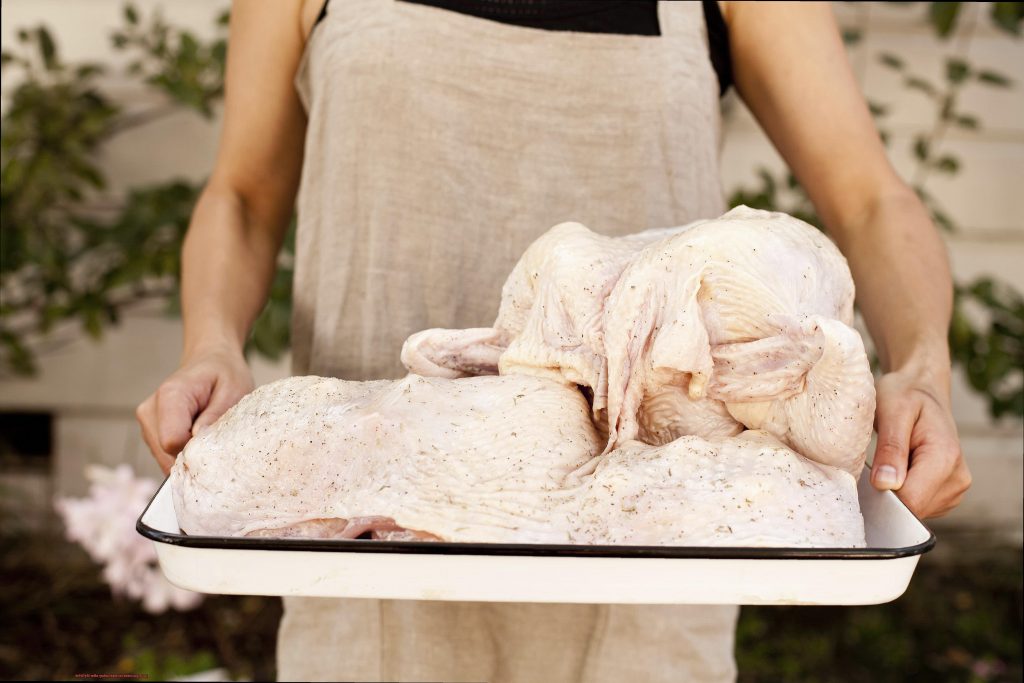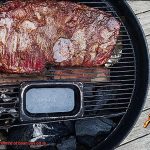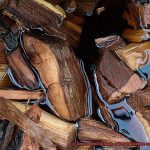Thanksgiving is just around the corner, and it’s time to start planning your feast. And let’s be real – the turkey is the star of the show. As you prepare for this beloved holiday, you may be wondering how to make the perfect bird. One question that often comes up is: do you need to rinse turkey after dry brine?
Dry brining has become a popular technique for many cooks in recent years. It involves rubbing a mixture of salt and other seasonings directly onto the turkey and letting it sit for a period of time, usually overnight. The result? A juicy, flavorful bird that will have your guests raving.
But here’s where things get a little hazy – some people say you must rinse the turkey after a dry brine, while others say it’s not necessary. So, who’s right?
In this blog post, we’ll explore the pros and cons of rinsing your turkey after a dry brine. We’ll also provide some tips and tricks for making the most delicious Thanksgiving turkey possible. Whether you’re a die-hard dry brine fan or a skeptic, keep reading to find out what you need to know about rinsing your turkey after a dry brine.
Contents
Reasons Why You May Not Need to Rinse the Turkey After Dry Brining
Dry brining is a popular technique used to add flavor and moisture to turkey meat. It involves rubbing a mixture of salt, herbs, and spices onto the turkey and letting it sit in the refrigerator for several hours or overnight. However, one question that many people have is whether or not to rinse the turkey after the brining process. Here are five reasons why you may not need to rinse the turkey after dry brining:
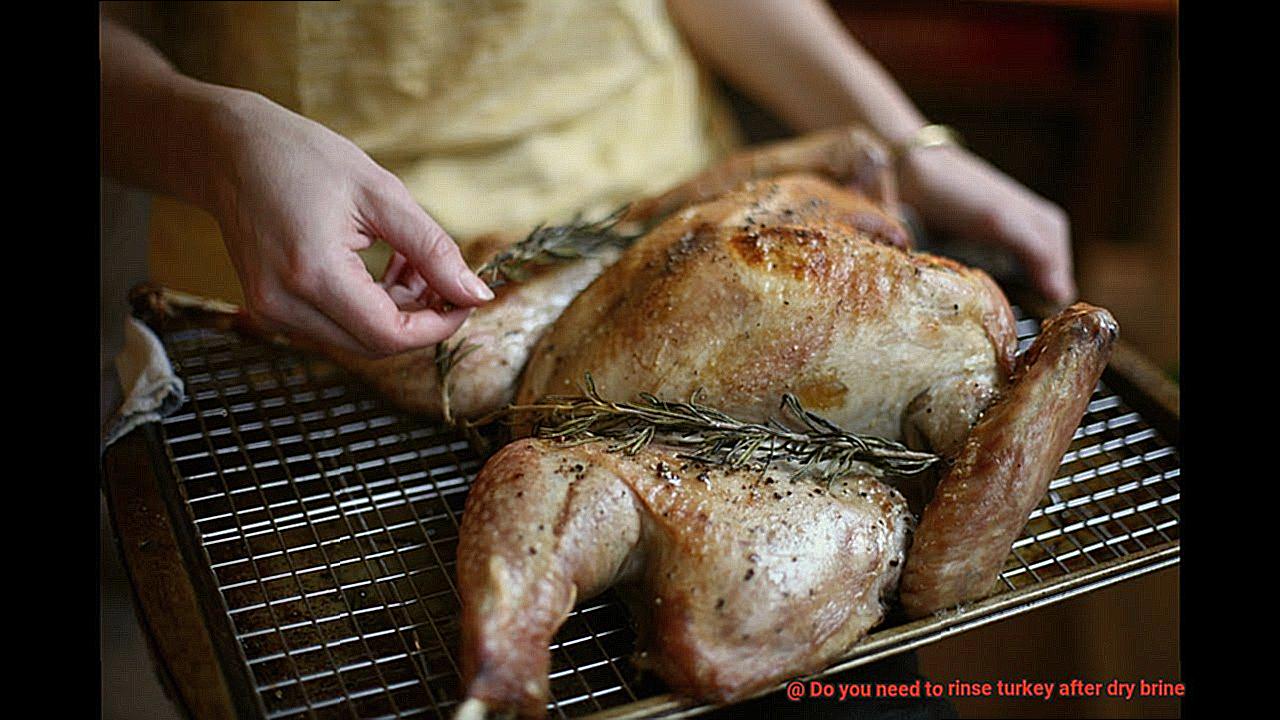
Rinsing can wash away flavorful seasoning
When you rinse the turkey after dry brining, you run the risk of washing away some of the flavorful seasoning that has been absorbed into the meat. This can result in a less flavorful final product. To ensure that your turkey is packed with flavor, it’s best not to rinse it.
Rinsing increases the risk of cross-contamination
Rinsing a turkey can increase the risk of cross-contamination and foodborne illness. When you rinse raw poultry, water droplets can splash onto surfaces in your kitchen, potentially contaminating them with harmful bacteria like Salmonella or Campylobacter. To avoid this risk, handle raw poultry carefully and avoid rinsing it if possible.
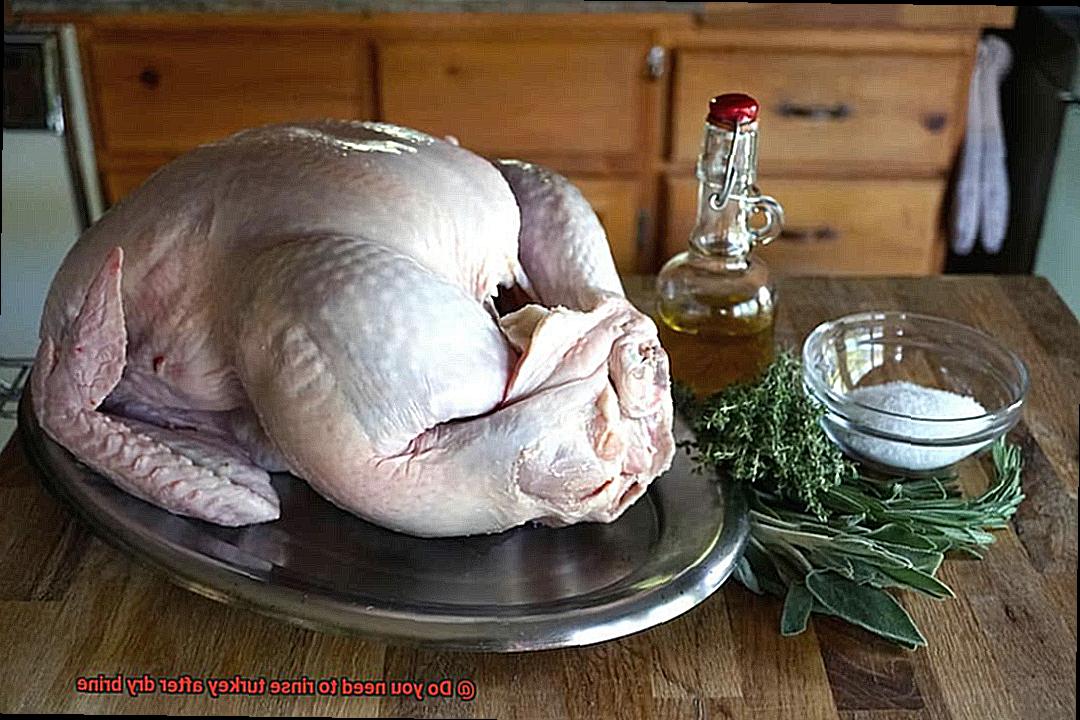
Rinsing can make it difficult to achieve crispy skin
Moisture on the surface of the turkey can prevent it from browning properly and achieving that desirable crispy texture. Therefore, rinsing the turkey before cooking can make it more difficult to achieve a crispy skin. If you want a perfectly crispy skin on your turkey, skip the rinse.
Minimal salt may not require rinsing
If you used a minimal amount of salt in your dry brine recipe, there may not be enough excess salt on the surface of the turkey to warrant rinsing it off. In this case, rinsing the turkey would be unnecessary and could actually result in a less flavorful final product.
Leaving seasoning on allows for deeper penetration
By leaving the seasoning on the surface of the meat, you allow it to penetrate deeper and create a more flavorful final product without compromising food safety or cooking results. So, if you want your turkey to be as flavorful as possible, it’s best to avoid rinsing it after dry brining.
In conclusion, there are several reasons why you may not need to rinse your turkey after dry brining. By leaving the seasoning on the surface of the meat, you allow it to penetrate deeper and create a more flavorful final product without compromising food safety or cooking results.
Reasons Why You Might Want to Consider Rinsing the Turkey After Dry Brining
Dry brining is a popular method for preparing turkey because it results in juicy and flavorful meat. However, some people wonder whether they need to rinse the turkey after dry brining. While rinsing may seem unnecessary, there are several reasons why it might be beneficial.
Remove Excess Salt
Firstly, dry brining involves rubbing the turkey with salt and other seasonings. While this helps to flavor the meat, it can also leave a salty residue on the surface. Rinsing the turkey can help to remove this excess salt, which can prevent the meat from becoming too salty during cooking. This is especially important if you are already using a salty brine or seasoning mix.
Remove Excess Moisture
Secondly, rinsing the turkey can help to remove any excess moisture that has accumulated on the surface during the dry brining process. This moisture can cause the skin to become soggy during cooking, which can affect the texture of the finished dish. By rinsing the turkey, you can eliminate this excess moisture and help to ensure that the skin becomes crispy and golden brown.
Ensure Food Safety
Finally, rinsing the turkey can help to remove any impurities or bacteria that may be present on the surface of the meat. While dry brining does not necessarily kill bacteria, it does create an inhospitable environment for their growth. However, if there are any harmful bacteria present on the surface of the turkey, rinsing can help to remove them and reduce the risk of foodborne illness.
It’s important to note that while rinsing can be beneficial, it should be done carefully to avoid cross-contamination. The turkey should be rinsed under cold running water and then patted dry with paper towels before cooking. Any utensils or surfaces that come into contact with the raw turkey should be cleaned and sanitized thoroughly to prevent the spread of bacteria.
How to Safely Rinse the Turkey After Dry Brining
Dry brining your turkey can be a delicious way to add flavor and moisture to your bird, but it’s essential to know how to safely rinse it before cooking.
Rinsing the turkey after dry brining can help remove excess salt and seasoning, but it can also be a potential source of contamination if not done correctly.
Here are five steps to help you safely rinse your turkey after dry brining.
Step 1: Check Your Recipe
Before you start rinsing your turkey, check your recipe to see if it calls for rinsing. Not all dry brine recipes require rinsing, so be sure to follow your recipe’s instructions carefully.
Step 2: Prepare Your Space
When you’re ready to rinse your turkey, choose a clean sink or large container that can comfortably hold the bird. Fill the sink with cold water until the turkey is fully submerged. Be sure to have plenty of paper towels on hand for drying.
Step 3: Rinse Gently
Use your hands to gently rub the turkey’s skin to loosen any excess seasoning or salt. You can also use a soft-bristled brush if needed, but be careful not to damage the skin. Keep the turkey submerged in the water as you rinse it, but avoid using hot water as this can cause bacteria to spread.
Step 4: Pat Dry
After rinsing the turkey thoroughly, pat it dry with paper towels or a clean cloth. Avoid using cloth towels that may harbor bacteria or other contaminants. Make sure to discard any towels or cloths used during this process immediately and wash your hands and any utensils used in hot, soapy water.
Step 5: Adjust Seasoning
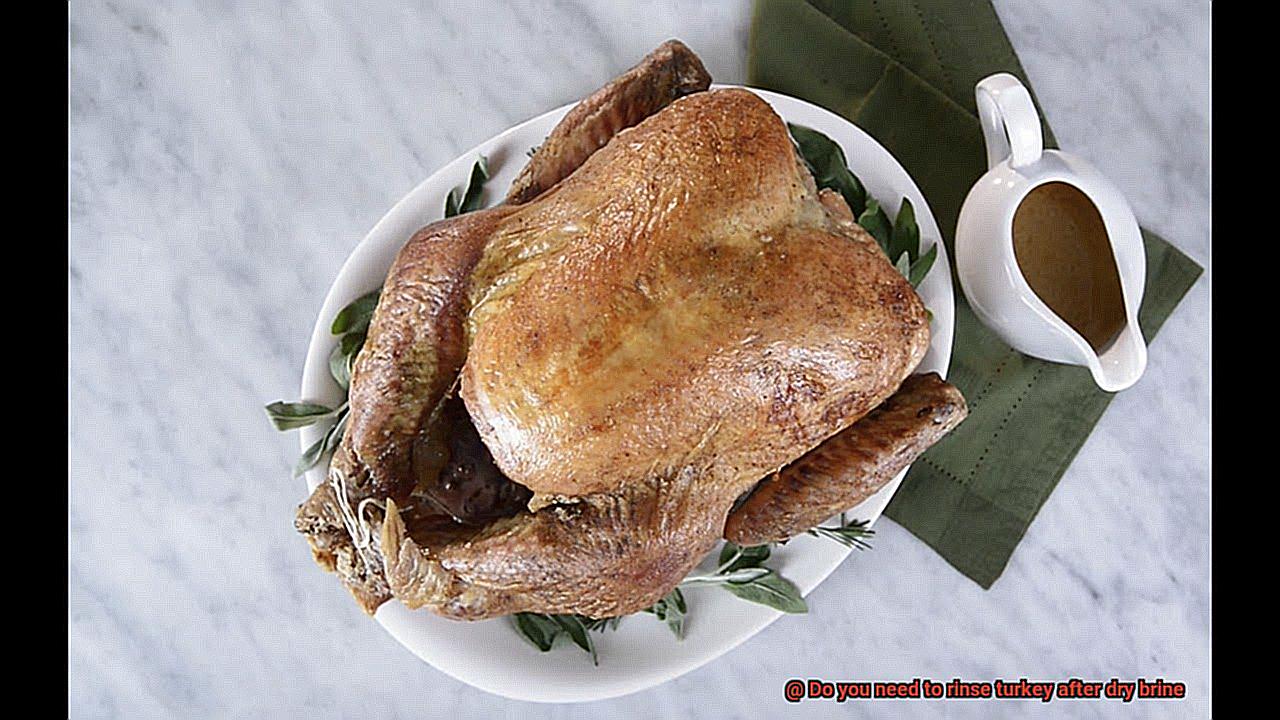
While rinsing can help remove excess salt from the surface of the turkey, it won’t completely remove all of the seasoning from the meat. So, be sure to factor this into your overall cooking plan and adjust seasoning accordingly.
What Happens if You Don’t Rinse the Turkey After Dry Brining?
It’s a controversial topic, with some people advocating for rinsing and others swearing against it. So, what happens if you don’t rinse the turkey after dry brining? Let’s explore.
Dry brining is a popular technique that involves rubbing salt and other seasonings onto the turkey and allowing it to sit in the refrigerator for several hours or overnight. The salt draws out moisture from the turkey, which is then reabsorbed along with the flavors of the seasonings, resulting in a tender and flavorful bird.
When it comes to rinsing, there are a few things to consider. For instance, if you dry brined your turkey for only a few hours, you may not need to rinse it before cooking. However, if you dry brined it overnight or for a longer period of time, there may be excess salt on the surface of the bird that could make it too salty if not rinsed off.
But the debate on rinsing doesn’t stop there. Some people prefer not to rinse their turkey after dry brining because they feel that it removes some of the flavor from the seasoning. In fact, rinsing could wash away some of the flavorful seasoning. If this is your preference, you can simply pat the turkey dry with paper towels before cooking to remove any excess moisture.
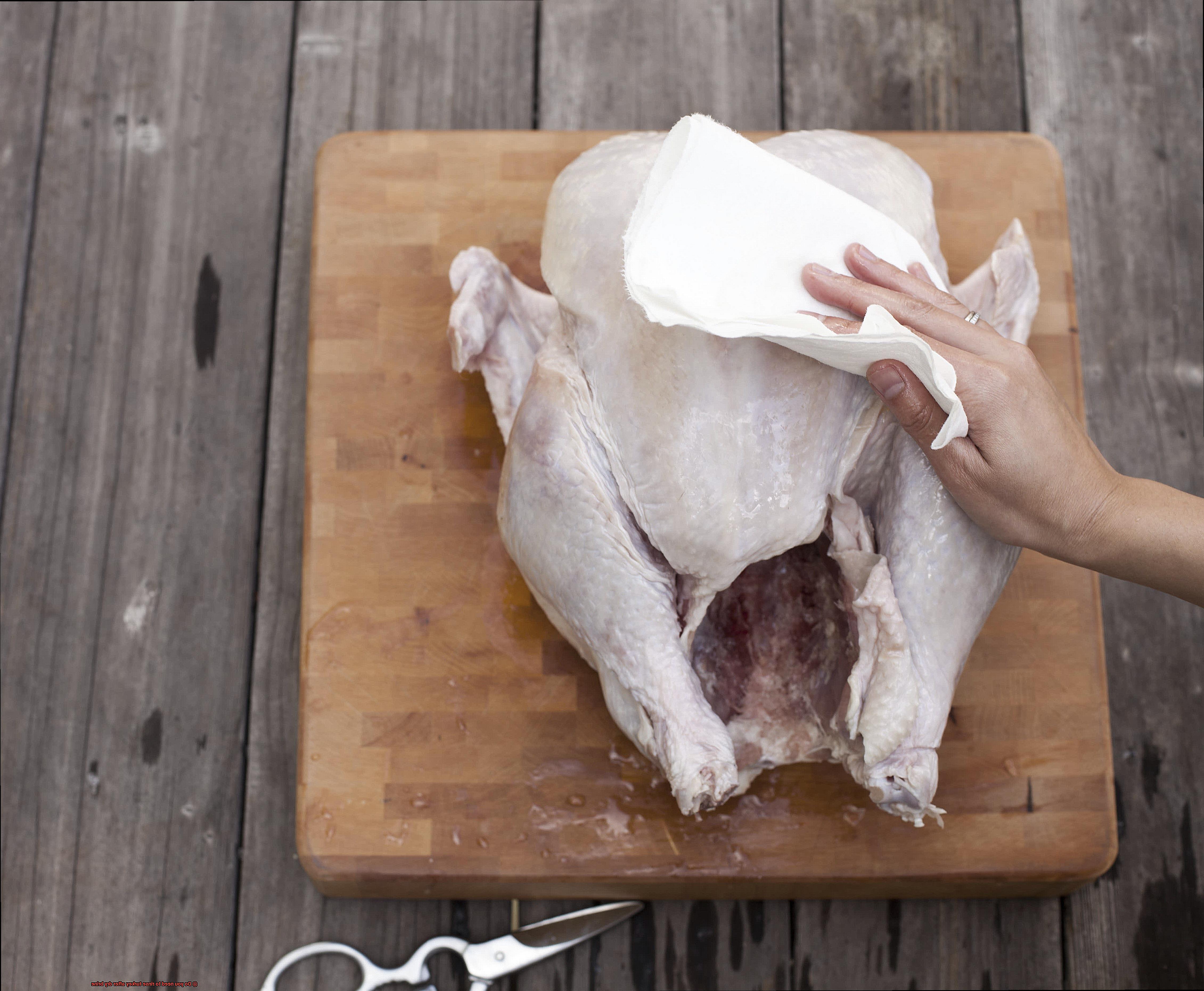
However, if too much salt was used during the dry brining process, it could lead to a salty flavor in the finished dish. In this case, rinsing the turkey after dry brining could help remove some of the excess salt and prevent an overly salty outcome.
In summary, whether or not to rinse your turkey after dry brining depends on personal preference and how long and how much salt was used during the process. Here are some key takeaways:
- If you dry brine your turkey for only a few hours, rinsing may not be necessary.
- If you dry brine your turkey overnight or for a longer period of time, excess salt may need to be rinsed off to prevent an overly salty outcome.
- If you prefer not to rinse your turkey after dry brining, patting it dry with paper towels before cooking is an option.
- If too much salt was used during the dry brining process and you want to remove some of the excess salt, rinsing the turkey could help.
Tips for Avoiding an Overly Salty Flavor When Dry Brining
Dry brining a turkey can be a game-changer for your Thanksgiving meal, but it’s important to avoid making it too salty. Follow these tips to ensure that your turkey is perfectly seasoned without going overboard.
Use Less Salt Than You Think You Need
Using the right amount of salt is key when dry brining. If you’re worried about it being too salty, use less salt than the recipe suggests. A good starting point is 1/2 teaspoon of salt per pound of turkey. Remember, you can always add more salt later if needed.
Be Mindful of the Type of Salt You Use
Different types of salt have different levels of salinity. Kosher salt is less salty than table salt, so you may need to use more if you’re using table salt. If you’re unsure about which type of salt to use, stick with kosher salt.
Don’t Leave the Turkey in the Dry Brine for Too Long
The longer the turkey sits in the dry brine, the more salt it will absorb. Aim for no more than 24 hours in the brine. If you’re pressed for time, even a few hours in the brine will make a difference.
Rinse the Turkey Before Cooking
Rinsing the turkey after dry brining can remove any excess salt and help prevent an overly salty flavor. Use cold water and pat the bird dry thoroughly with paper towels before proceeding with your recipe.
Use Herbs and Spices
Incorporating herbs and spices into your dry brine can add more flavor and help balance out any saltiness. Consider adding thyme, rosemary, sage, or garlic powder to your dry brine mixture. But remember not to go overboard with these seasonings either.
Should You Reapply Seasonings After Rinsing?
We’ve covered everything from avoiding a salty flavor to infusing your bird with delicious aromatics. But, one question still remains: should you reapply seasonings after rinsing?
The answer isn’t straightforward and depends on personal preference and the recipe you’re using. Some argue that rinsing helps remove excess salt, while others believe it washes away infused flavors. So, if you’re satisfied with the level of seasoning before rinsing, there may not be a need to reapply.
However, adding more seasonings after rinsing can alter the texture of your turkey. The salt in the dry brine breaks down proteins, resulting in a tender texture. Adding more seasonings can disrupt this process and lead to a tougher, drier bird.
If you choose to reapply seasonings after rinsing, do so sparingly. Over-seasoning can overpower your turkey’s natural flavor and create an unbalanced seasoning profile. A light sprinkle of herbs or spices should suffice.
In summary, reapplying seasonings after rinsing is a matter of personal preference. If you’re looking for added flavor, go ahead and add some additional seasonings. However, be mindful of how much you use and how it may affect the texture of the meat.
The Bottom Line: Is Rinsing Necessary?
Dry brining a turkey is a fantastic way to infuse it with flavor and keep it juicy during cooking. However, once the bird is fully seasoned, a common question arises: should you rinse it before cooking? The answer isn’t black and white, as it depends on your personal preferences and the dry brine recipe you used.
On one hand, rinsing can remove excess salt that may have accumulated on the surface of the turkey during the dry brine process. This is particularly important if you’re heavy-handed with salt. However, rinsing can also wash away some of the flavorful seasoning that has been absorbed into the bird.
To rinse or not to rinse? That is the question. If you’re concerned about excess salt, go ahead and give your turkey a quick rinse with cold water. But be sure to pat it dry with paper towels after rinsing to prevent unwanted moisture. On the other hand, if you’re confident that your dry brine has created enough flavor, skip the rinse and head straight to cooking.
It’s crucial to note that rinsing can increase the risk of cross-contamination in your kitchen if not done correctly. Always follow proper food safety guidelines when handling raw poultry to avoid any foodborne illnesses.
In summary, whether or not to rinse your turkey after dry brining ultimately depends on your personal preference and the recipe you used. To make it easier for you, here are some key points to consider:
Pros of Rinsing:
- Removes excess salt
- Can prevent overly salty meat
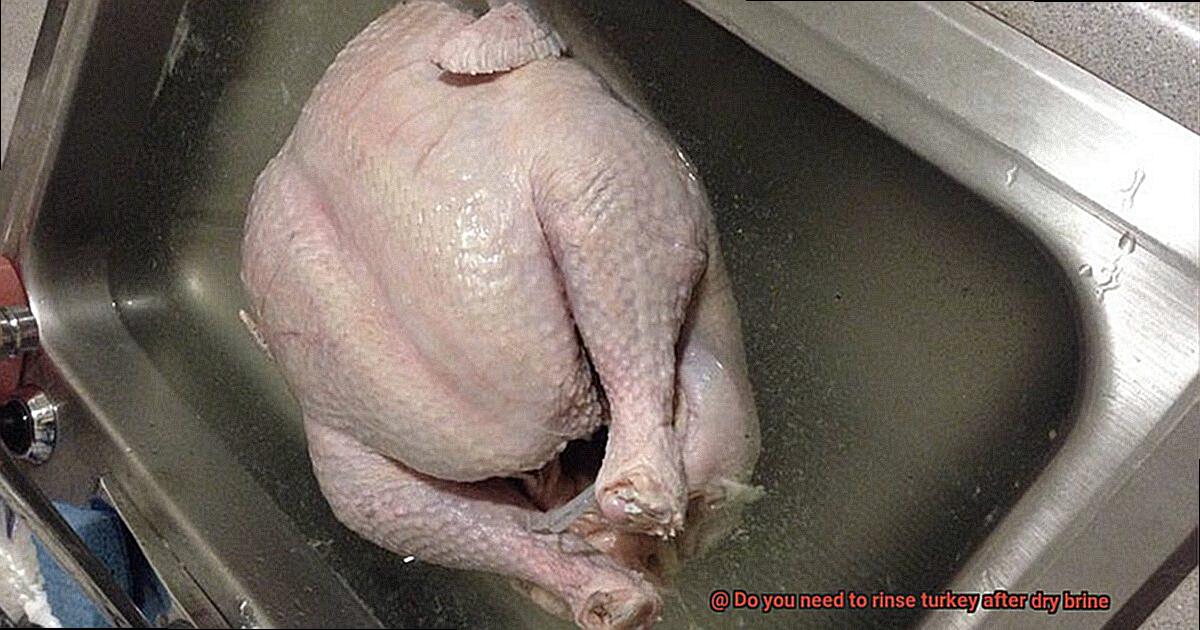
Cons of Rinsing:
- Can wash away flavorful seasoning
- Increases risk of cross-contamination
If you choose to rinse:
- Use cold water
- Pat dry with paper towels
If you choose not to rinse:
- No need to pat dry
- Enjoy the full flavor of your dry brine
Conclusion
In conclusion, the age-old question of whether or not to rinse a turkey after dry brining is not a simple one. The answer depends on various factors, including your personal preference and the recipe you are using. Dry brining has become an increasingly popular technique for enhancing the flavor and moisture of turkey meat. However, rinsing could potentially wash away some of the seasoning and increase the risk of cross-contamination.
There are several compelling reasons why you may choose not to rinse your turkey after dry brining. Leaving the seasoning on allows for deeper penetration into the meat, which can result in a more flavorful bird. Additionally, skipping the rinse can help achieve that coveted crispy skin that everyone loves so much. Lastly, if only a minimal amount of salt was used during the dry brine process, rinsing may not be necessary at all.
On the other hand, there are instances where rinsing your turkey after dry brining could be beneficial. If too much salt was used during the dry brine process or if you want to remove any impurities or bacteria from your bird, then rinsing might be necessary.
If you do decide to rinse your turkey after dry brining, make sure to do so carefully under cold running water and pat it dry with paper towels before cooking. Alternatively, if you prefer not to rinse your turkey at all, simply pat it dry with paper towels before cooking.
Ultimately, whether or not to rinse your turkey after dry brining comes down to personal preference and what works best for your recipe. Always remember to follow proper food safety guidelines when handling raw poultry to avoid any potential foodborne illnesses.

